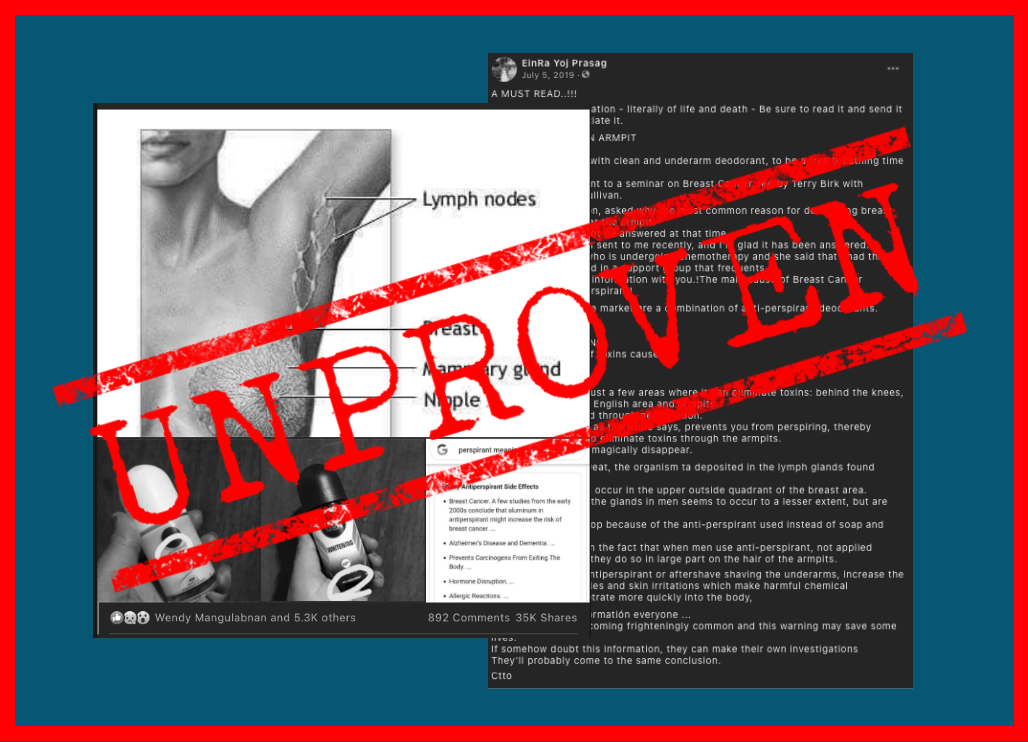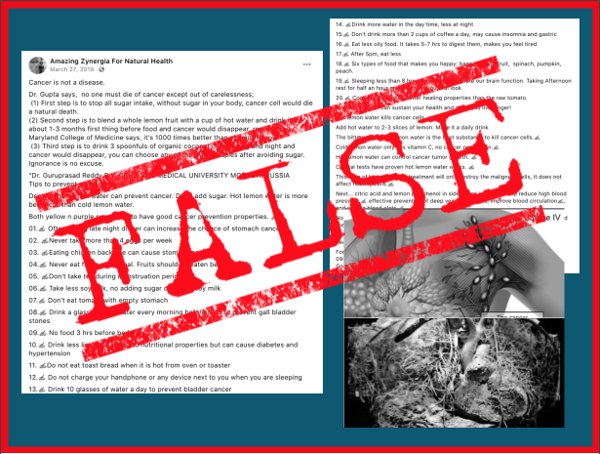A claim that using antiperspirants could lead to breast cancer has been rousing conversations online. Current evidence, however, still points to it being unproven.
“To date, there is no scientific evidence to link the use of these products to breast cancer,” said Kenneth Samala, a medical oncologist from ManilaMed hospital, in an email to VERA Files Fact Check.
The Facebook (FB) post of a netizen from July 5, 2019 has stirred its readers’ emotions by saying that breast cancer is “frighteningly common” and “this warning may save some lives.” The post, which continues to gain traction, erroneously claimed that: “The main cause of breast cancer is the use of antiperspirant.”

But several factors have been associated with the development of breast cancer, including age, genetics, family history, diet, alcohol, obesity, lifestyle, physical inactivity, and endocrine factors, according to Samala, who is also affiliated with the Manila Doctors Hospital and Our Lady of Lourdes Hospital.
To date, the FB post has been shared by over 195,000 online users. Of the 1,500 comments, one of them said “this may be the answer” as to why he has small and large lymph nodes in his underarm.
The post cited four main reasons to back up its claim that antiperspirants cause cancer. VERA Files Fact Check verifies each claim below:
|
Claim |
Rating |
|
Antiperspirants, because they prevent sweating, inhibit the body from eliminating toxins through the armpits. Therefore, the concentration of toxins from antiperspirants causes cell mutation. |
FALSE |
Sweat is not made up of toxins from one’s body but “it is mostly composed of 99% water and the rest are salts, proteins, carbohydrates, and urea,” Samala explained. “The belief that it can cleanse the body from toxins is a myth,” he added.
These toxins, he said, are eliminated through the kidney, liver, and intestines.
The post also did not mention a specific toxic substance being “inhibited” when using antiperspirants.
But Samala noted that some scientists have looked into aluminum, a potentially harmful ingredient present in antiperspirants, that “may have a possible connection to breast cancer.”
In a 2014 explainer, the American Cancer Society concluded that there is “no clear link between antiperspirants containing aluminum and breast cancer,” citing a preliminary study, uploaded in the Food and Chemical Toxicology Journal, that found only 0.012% of aluminum was absorbed through the skin when using antiperspirants.
|
Claim |
Rating |
|
Most breast cancers occur in the upper outside quadrant of the breast area, breast cancer can develop by using antiperspirant instead of soap and water. “Organisms” that are prevented from being eliminated by antiperspirants are deposited in the lymph nodes. |
NO BASIS |
Lymph nodes — although they help clear out bacteria, viruses, and other possible threats to the body — do not release waste or toxins by sweating, the Cancer Council in Western Australia wrote in a 2015 article. These nodes are, in fact, not connected to sweat glands which are located in the skin.
While some scientists have pointed out that the upper outer part of the breast is the most frequent site of breast cancer, the American Cancer Society stressed that there is “no evidence to suggest that the location of cancers within the breast is related to using antiperspirants.”
|
Claim |
Rating |
|
Men are less likely than women to develop breast cancer because when the former use antiperspirants, it is not directly applied on the skin but in large part, on their armpit hair. |
FALSE |
Samala clarified that the incidence of breast cancer is lower among men than in women because of the “architecture of the male breast tissue and hormones.”
Majority of breast cancers can develop in ducts and lobules (which is a small part of a lobe in the breast). “Since men have fewer and smaller ducts, and may not even have lobules, breast cancer risk is significantly reduced compared to their female counterparts,” he said.
Still, the American Cancer Society reminded that “some men with metabolic or genetic conditions that lead to increased estrogen levels have an increased risk of developing breast cancer.”
Another reason for the higher risk in women, Samala said, is the difference in the levels of estrogen, which is a hormone that is naturally occurring to everyone but to a lesser extent in men. And so, the risk of men “tends to be lower as well.”
On the other hand, too much estrogen can “possibly aid in the development of breast cancer” which can stimulate the growth of cancer cells.
|
Claim |
Rating |
|
Women who shave their underarms and apply antiperspirant increase their risk of breast cancer because of tiny injuries and skin irritations, making way for harmful chemical components to penetrate more quickly into the body. |
FALSE |
Shaving and then applying antiperspirant does not increase women’s risk for breast cancer.
Experts said if the underarm skin is already broken or infected, it is possible that some antiperspirants could cause slight irritation. But it is unlikely to be “a major source of cancer-causing substances that get into the body and reach the breast cells.”
Samala made reference to a 2003 study, uploaded in the European Journal of Cancer, that surveyed 477 females with breast cancer who shave and then use antiperspirants indicated an earlier diagnosis of breast cancer. But the researcher of the study noted that “case-controlled investigations are needed before alternative underarm hygiene habits are suggested.”
The United States National Cancer Institute said “only a few studies have investigated a possible relationship between breast cancer and underarm antiperspirants.” In a fact sheet, it emphasized that: “Studies of antiperspirants and deodorants and breast cancer have provided conflicting results, additional research would be needed to determine whether a relationship exists.”
Samala advised the public to consult doctors, who are most qualified to answer medical questions about these topics rather than look for unverified information on the internet.
(Editor’s Note: VERA Files has partnered with Facebook to fight the spread of disinformation. Find out more about this partnership and our methodology.)
Have you seen any dubious claims, photos, memes, or online posts that you want us to verify? Send us a message here or here.





